Unit 28 Every day is different课件 (共104张PPT)
文档属性
| 名称 | Unit 28 Every day is different课件 (共104张PPT) |

|
|
| 格式 | pptx | ||
| 文件大小 | 10.0MB | ||
| 资源类型 | 教案 | ||
| 版本资源 | 新概念英语 | ||
| 科目 | 英语 | ||
| 更新时间 | 2024-04-17 15:51:26 | ||
图片预览

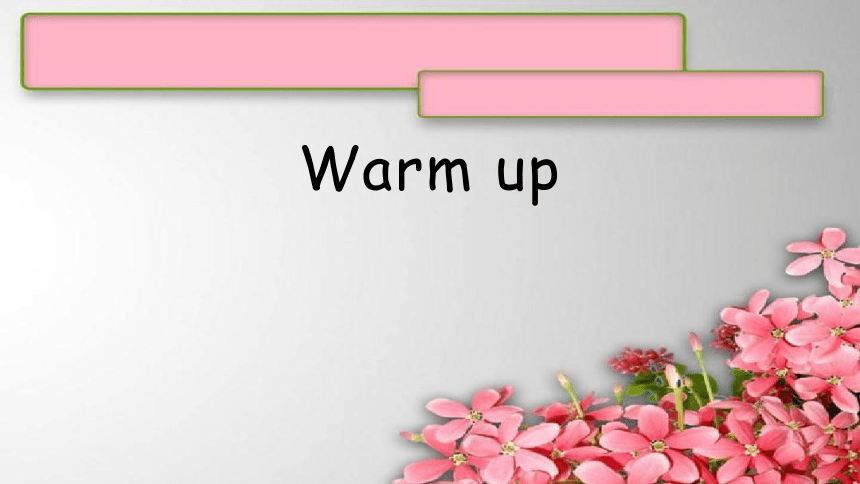

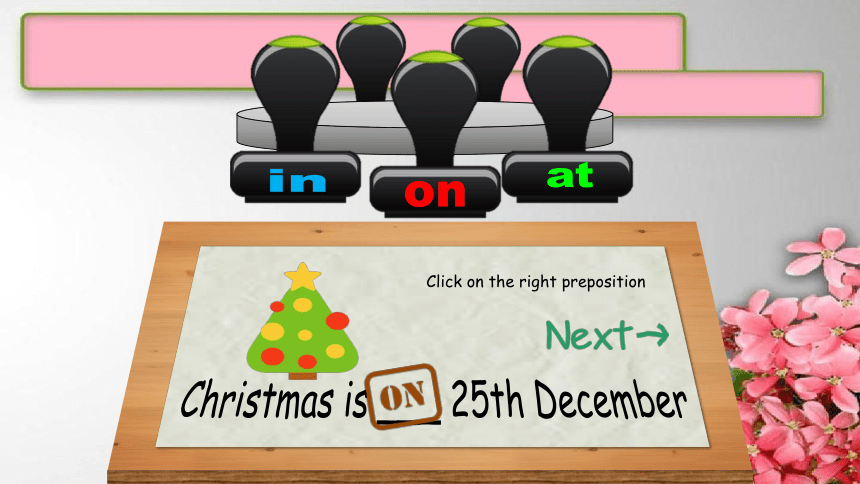
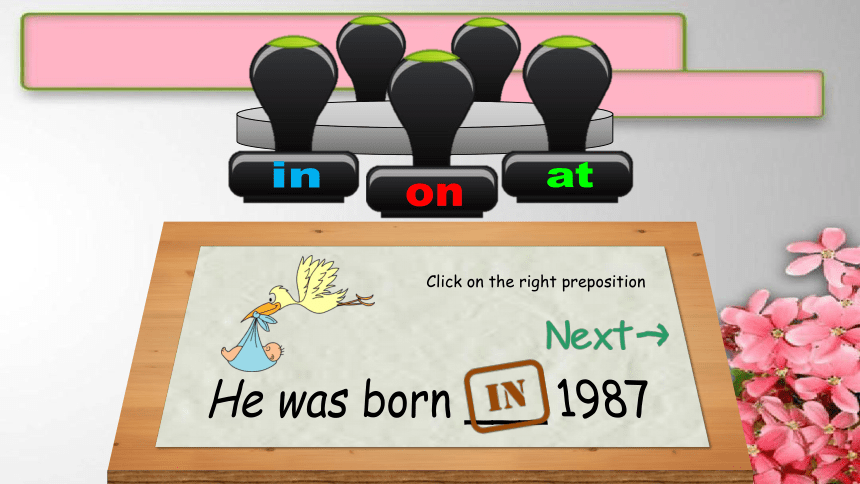
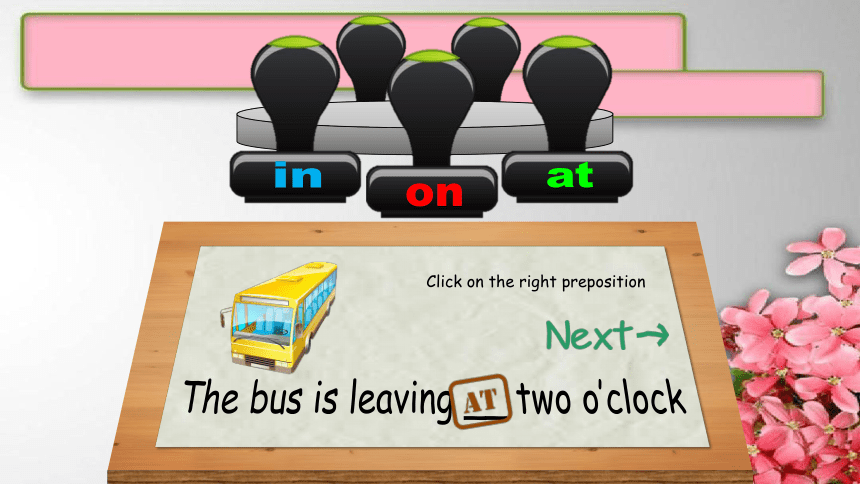
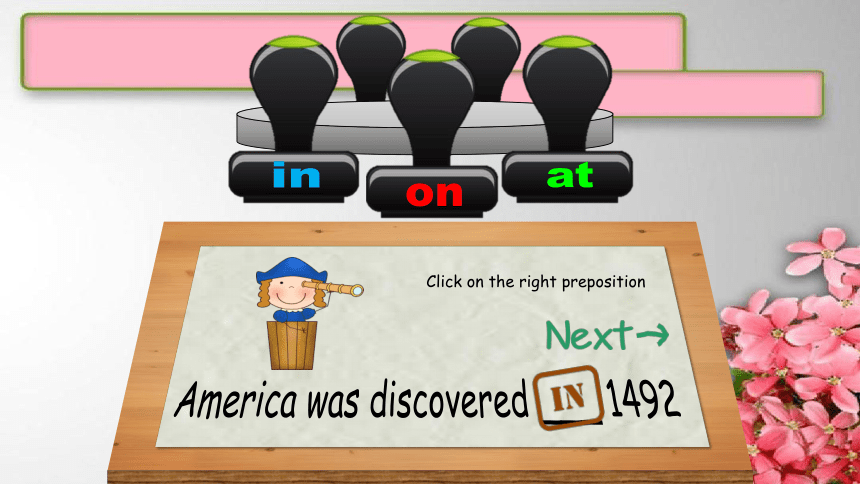

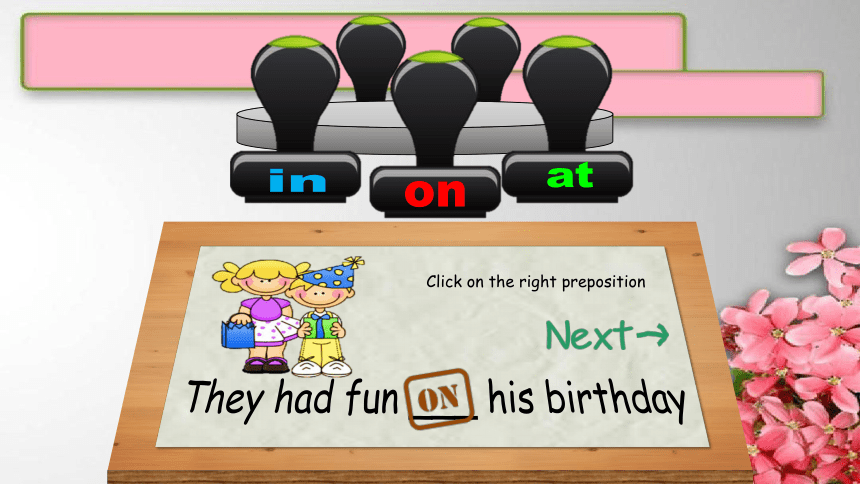


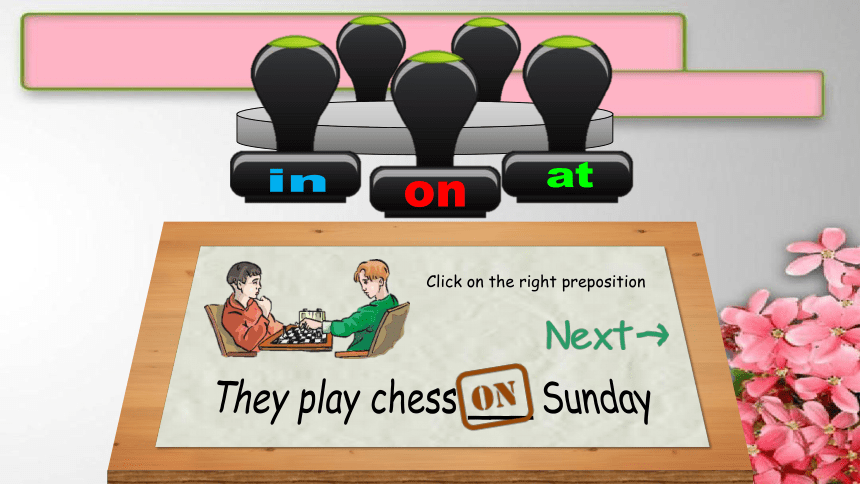
文档简介
(共104张PPT)
Unit28
Every day is different
Warm up
in
on
He had lunch ___ noon
at
Click on the right preposition
at
in
Christmas is ___ 25th December
Click on the right preposition
on
at
on
He was born ___ 1987
Click on the right preposition
in
in
on
The bus is leaving __ two o’clock
at
Click on the right preposition
at
on
Click on the right preposition
America was discovered ___ 1492
in
at
on
She goes to the beach ___ Summer
Click on the right preposition
in
at
in
They had fun ___ his birthday
Click on the right preposition
on
at
on
Valentine‘s Day is ___ February
Click on the right preposition
in
at
on
She goes shopping ___ the morning
Click on the right preposition
in
at
in
They play chess ___ Sunday
Click on the right preposition
on
at
in
They went to the disco ___ Saturday night
Click on the right preposition
on
Review
toothache [ tu θe k] 牙痛
headache [ hede k] 头痛
stomach-ache [ st m k e k] 肚子痛
earache [ re k] 耳朵痛
flu [flu ] 流感
a bad cold 重感冒
sick 生病的
feel
awful [ fl]
miserable [ m zr bl]
dentist [ dent st]
patient [ pe nt]
emergency [i m d nsi]
appointment [ p ntm nt]
感到
不舒服的
痛苦的
牙医
病人
急诊
约定
1.介词的使用(in / on / at )
in + 大时间 年/月/季节
固定搭配:in the morning/afternoon/evening
on + 两期(日期/星期)两日(生日/节日)
at +具体的时间点
固定搭配:at noon在正午 at night 在午夜
(in > 一天 on= 一天 at < 一天)
2.对疼痛的提问和回答:
--What's the matter with sb
--主语 have/has got + 病痛.(头疼感冒前加a)
3.询问某人感觉怎么样?
--How do/does sb feel
--主语+feel/feels...
--How does she feel
--She feels awful.
1.___ Sunday
2.___ 2:10
3.We have got stomach-ache.
4.___ my birthday
5.___ 12:00
6.My father has got a headache.
7.___ January the first
8.__ February
9.Lucy has got toothache.
10.__ 4:45
11.__ Children’s Day
12.He has got earache.
13.__ the third of May
14.__ noon
15.We have got earache.
presentation
Pronunciation
/r/
red rain round Robert referee Karen camera cream dry
try spring bread breakfast orange drawing surprise
New words and expressions
season n / si zn/ 季节
spring n /spr / 春天
summer n / s m (r)/ 夏天
autumn n / t m/ 秋天
winter n / w nt (r)/ 冬天
sun n /s n/ 太阳
shine v / a n/ 闪耀,发光
snow v /sn / 下雪
rain v /re n/ 下雨
weather n / we (r)/ 天气
season n / si zn/ 季节
spring n /spr / 春天
summer n / s m (r)/ 夏天
autumn n / t m/ 秋天
winter n / w nt (r)/ 冬天
sun n /s n/ 太阳
shine v / a n/ 闪耀,发光
snow v /sn / 下雪
rain v /re n/ 下雨
weather n / we (r)/ 天气
sunny adj / s ni/ 阳光灿烂的
cloudy adj / kla di/多云的
windy adj / w ndi/ 刮风的
Grammar
always adv / lwe z/ 总是
usually adv / ju u li/经常
often adv / fn/ 经常
sometimes adv / s mta mz/有时,偶尔
never adv / nev (r)/ 从不
100%
80%
60%
40%
0%
频率副词
Remember
always
usually
often
sometimes
never
0 %
100 %
一般现在时态(be 动词)
He is a basketball player.
My parents are very friendly.
一般现在时态:(be 动词)
一、定义:
表示经常反复发生的动作或存在的状态
描述性质、特征、能力;
表示普遍真理,事实,也用在格言中
二、标志词(频率)
always,usually,often,sometimes,never,
every morning/afternoon/evening/day
be后动前
1.It _①_ is _②_ windy and warm in spring.
2.It _①_ rains _②_ in spring.
3.Is it _①_ sunny and dry _②_ in summer
4.It is _①_ wet _②_ in May.
5.It _①_ shines _②_ in August.
6.Is it _①_ cloudy and cool _②_ in autumn
三、结构
eg.I am a student.
He is kind.
Our bags are heavy.
肯定句型:
主语(人/物)+ be动词+其他
1.Her father __ a teacher.
2.Lucy and Tom __ doctors.
3.It __ rainy and cool.
4.I __ a student.
5.They __ musicians.
6.My parent __ a police officer.
句型转换:
一:变否定
I am a student.→I'm not a student.
She is friendly.→She isn't friendly.
规则:一找(be动词);二加(not);
否定句型:主语+be not+其他.
二:变一般疑问句
I am a student.→Are you a student
Yes,I am./No,I'm not.
Lucy is a doctor.→Is Lucy a doctor
Yes,she is./No,she isn't.
规则:一找(be动词);二提(句首);
三变(人称,符号,大小写)
句型:
Be +主语 +其他?
Yes,sb(人称代词) be.
No,sb(人称代词) be not.
1.She is Chinese.(变否定)
2.They are teachers.(变为一般疑问句并回答)
3.My parents are police officers.(变为一般疑问句并回答)
4.It is cloudy and cool in autumn.(变否定)
5.Tom is hot.(变否定)
6.Jim's sister is a firefighter.(变为一般疑问句并回答)
7.It is a dog.(变否定)
8.My father is an English teacher.(变为一般疑问句并回答)
9.We are good friends.(变为一般疑问句并回答)
10.Karen and Polly are happy.(变否定)
11.I am sleepy.(变为一般疑问句并回答)
12.Their teachers are young.(变否定)
13.They are happy.(一般疑问)
询问天气怎么样?
1)It is sunny and hot in summer.(对划线处提问)
→What's the weather like in summer
2)It is windy in France.(对划线处提问)
→What's the weather like in France
3)It’s rainy today.(对划线处提问)
→What's the weather like today
询问天气:
---What’s the weather like in +地点/季节?
(询问今天的天气不加in)
询问你最喜欢的季节是什么?
--Which season do you like best
/What’s your favourite season
--I like spring.
/My favourite season is spring.
1.频率副词
2.询问天气、最喜欢的季节
3.一般现在时
Text
words+passage
different n / d f r nt/ 不同的
same adj /se m/ 同样的
mean adj /mi n/ 意思是
different n / d fr nt/ 不同的
same adj /se m/ 同样的
mean adj /mi n/ 意思是
quite adv /kwa t/ 相当,十分
ever adj / ev (r)/ 曾经
especially [ spe li] 尤其,特别
difficulty [ d f k lti] 困难
change [t e nd ] 变化
temperature [ tempr t ] 温度
climate n / kla m t/ 气候
change v,[t e nd ] 变化
difficulty adj,[ d f k lti] 困难
especially adv,[ spe li] 尤其,特别
temperature n [ tempr t ] 温度
climate n / kla m t/ 气候
England n / ɡl nd/ 英国
France n / frɑ ns/ 法国
Russia n / r / 俄罗斯
Africa n /' fr k / 非洲
Atlantic [ t l nt k] 大西洋
England n / ɡl nd/ 英国
France n / frɑ ns/ 法国
Russia n / r / 俄罗斯
Africa n /' fr k / 非洲
Atlantic n / t l nt k/ 大西洋
passage
Paul:Hello, Claire!How are you today
Claire:Hi, Paul!I'm fine, but I hate this weather!
Paul:What do you mean
The weather's quite nice today.
Claire:It’s wet!It's always wet!
Is it ever fine and warm in England
1.hate,讨厌
hate+V-ing,讨厌做某事
She hates dancing.
2.wet(潮湿的)--dry(干燥的)
3.频率副词
Paul:Hello, Claire!How are you today
Claire:Hi, Paul!I'm fine, but I hate this weather!
Paul:What do you mean
The weather's quite nice today.
Claire:It’s wet!It's always wet!
Is it ever fine and warm in England
Paul:Hello, Claire!How are you today
Claire:Hi, Paul!I'm fine,
but I hate this ___!
Paul:What ___ you ___
The weather's ___ nice today.
Claire:It’s wet!It's always wet!
Is it ever fine and warm in ___
Paul:Well, of course it is !It's always lovely in summer!
Claire:But when is that
Is it ever dry and sunny for two days together
Paul:Well, that's how it is with an Atlantic
climate!It's often hot and dry in summer.
But it rains sometimes in summer,too,
especially in July.
Paul:Well, of course it is !
It's always lovely in summer!
Claire:But when is that
Is it ever dry and sunny for two days together
Paul:Well, that's how it is with an Atlantic
climate!It's often hot and dry in summer.
But it rains sometimes in summer,too,
especially in July.
大西洋气候就是这样的!
1.时间介词:in/on/at
2.weather:指某特定地区在一定时间的气象情况,例如晴天、阴雨,暴雪等。
What‘s the weather like today
climate:指一般比较长的时间,如一季的天气,指一地的总体气候情况或者特点 。
What is the climate like in winter in Beijing
3.for two days together,连着两天
Paul:Well, of course it is !It's always lovely in summer!
Claire:But when is that
Is it ever dry and sunny for two days together
Paul:Well, that's how it is with an Atlantic
climate!It's often hot and dry in summer.
But it rains sometimes in summer,too,
especially in July.
Claire:You're right.
It's July now. It's cool,and it's very wet!
PAUL:Well, that's the difficulty!
It's wet now, and cool, too.
The weather changes all the time.
But we have an interesting climate!
Every day is different!
1.That's the difficulty. =That's the problem.
那就是问题所在。
2.all the time 一直
eg.It's raining all the time.
3.interesting 有趣的
这是一本有意思的书。
eg.This is an interesting book.
Claire:You're right.
It's July now. It's cool,and it's very wet!
PAUL:Well, that's the difficulty!
It's wet now, and cool, too.
The weather changes all the time.
But we have an interesting climate!
Every day is different!
Summary
1.一般现在时
2.询问天气
3.all the time
Unit28
1.频率副词(be后动前)
always 总是 usually 经常
often 经常 sometimes 有时,偶尔
never 从不
2.一般现在时态:(be 动词)
一、定义:
表示经常反复发生的动作或存在的状态
描述性质、特征、能力;
表示普遍真理,事实,也用在格言中
二、标志词(频率)
always,usually,often,sometimes,never,
every morning/afternoon/evening/day
三、结构
肯定句型:主语(人/物)+ be动词+其他
否定句型:主语+be not+其他.
规则:一找(be动词);二加(not);
一般疑问句:Be sb+其他?
Yes,sb(人称代词) be./No,sb(人称代词) be not.
规则:一找(be动词);二提(句首);三变(人称一变二,句号变问号)
3.询问天气:
---What’s the weather like in +地点/季节?
(询问今天的天气不加in)
4.询问你最喜欢的季节是什么?
--Which season do you like best
/What’s your favourite season
--I like spring./My favourite season is spring.
5.hate,讨厌
hate+V-ing,讨厌做某事
She hates dancing.
6.all the time 一直
eg.It's raining all the time.
Thank you
Unit28
Every day is different
Warm up
in
on
He had lunch ___ noon
at
Click on the right preposition
at
in
Christmas is ___ 25th December
Click on the right preposition
on
at
on
He was born ___ 1987
Click on the right preposition
in
in
on
The bus is leaving __ two o’clock
at
Click on the right preposition
at
on
Click on the right preposition
America was discovered ___ 1492
in
at
on
She goes to the beach ___ Summer
Click on the right preposition
in
at
in
They had fun ___ his birthday
Click on the right preposition
on
at
on
Valentine‘s Day is ___ February
Click on the right preposition
in
at
on
She goes shopping ___ the morning
Click on the right preposition
in
at
in
They play chess ___ Sunday
Click on the right preposition
on
at
in
They went to the disco ___ Saturday night
Click on the right preposition
on
Review
toothache [ tu θe k] 牙痛
headache [ hede k] 头痛
stomach-ache [ st m k e k] 肚子痛
earache [ re k] 耳朵痛
flu [flu ] 流感
a bad cold 重感冒
sick 生病的
feel
awful [ fl]
miserable [ m zr bl]
dentist [ dent st]
patient [ pe nt]
emergency [i m d nsi]
appointment [ p ntm nt]
感到
不舒服的
痛苦的
牙医
病人
急诊
约定
1.介词的使用(in / on / at )
in + 大时间 年/月/季节
固定搭配:in the morning/afternoon/evening
on + 两期(日期/星期)两日(生日/节日)
at +具体的时间点
固定搭配:at noon在正午 at night 在午夜
(in > 一天 on= 一天 at < 一天)
2.对疼痛的提问和回答:
--What's the matter with sb
--主语 have/has got + 病痛.(头疼感冒前加a)
3.询问某人感觉怎么样?
--How do/does sb feel
--主语+feel/feels...
--How does she feel
--She feels awful.
1.___ Sunday
2.___ 2:10
3.We have got stomach-ache.
4.___ my birthday
5.___ 12:00
6.My father has got a headache.
7.___ January the first
8.__ February
9.Lucy has got toothache.
10.__ 4:45
11.__ Children’s Day
12.He has got earache.
13.__ the third of May
14.__ noon
15.We have got earache.
presentation
Pronunciation
/r/
red rain round Robert referee Karen camera cream dry
try spring bread breakfast orange drawing surprise
New words and expressions
season n / si zn/ 季节
spring n /spr / 春天
summer n / s m (r)/ 夏天
autumn n / t m/ 秋天
winter n / w nt (r)/ 冬天
sun n /s n/ 太阳
shine v / a n/ 闪耀,发光
snow v /sn / 下雪
rain v /re n/ 下雨
weather n / we (r)/ 天气
season n / si zn/ 季节
spring n /spr / 春天
summer n / s m (r)/ 夏天
autumn n / t m/ 秋天
winter n / w nt (r)/ 冬天
sun n /s n/ 太阳
shine v / a n/ 闪耀,发光
snow v /sn / 下雪
rain v /re n/ 下雨
weather n / we (r)/ 天气
sunny adj / s ni/ 阳光灿烂的
cloudy adj / kla di/多云的
windy adj / w ndi/ 刮风的
Grammar
always adv / lwe z/ 总是
usually adv / ju u li/经常
often adv / fn/ 经常
sometimes adv / s mta mz/有时,偶尔
never adv / nev (r)/ 从不
100%
80%
60%
40%
0%
频率副词
Remember
always
usually
often
sometimes
never
0 %
100 %
一般现在时态(be 动词)
He is a basketball player.
My parents are very friendly.
一般现在时态:(be 动词)
一、定义:
表示经常反复发生的动作或存在的状态
描述性质、特征、能力;
表示普遍真理,事实,也用在格言中
二、标志词(频率)
always,usually,often,sometimes,never,
every morning/afternoon/evening/day
be后动前
1.It _①_ is _②_ windy and warm in spring.
2.It _①_ rains _②_ in spring.
3.Is it _①_ sunny and dry _②_ in summer
4.It is _①_ wet _②_ in May.
5.It _①_ shines _②_ in August.
6.Is it _①_ cloudy and cool _②_ in autumn
三、结构
eg.I am a student.
He is kind.
Our bags are heavy.
肯定句型:
主语(人/物)+ be动词+其他
1.Her father __ a teacher.
2.Lucy and Tom __ doctors.
3.It __ rainy and cool.
4.I __ a student.
5.They __ musicians.
6.My parent __ a police officer.
句型转换:
一:变否定
I am a student.→I'm not a student.
She is friendly.→She isn't friendly.
规则:一找(be动词);二加(not);
否定句型:主语+be not+其他.
二:变一般疑问句
I am a student.→Are you a student
Yes,I am./No,I'm not.
Lucy is a doctor.→Is Lucy a doctor
Yes,she is./No,she isn't.
规则:一找(be动词);二提(句首);
三变(人称,符号,大小写)
句型:
Be +主语 +其他?
Yes,sb(人称代词) be.
No,sb(人称代词) be not.
1.She is Chinese.(变否定)
2.They are teachers.(变为一般疑问句并回答)
3.My parents are police officers.(变为一般疑问句并回答)
4.It is cloudy and cool in autumn.(变否定)
5.Tom is hot.(变否定)
6.Jim's sister is a firefighter.(变为一般疑问句并回答)
7.It is a dog.(变否定)
8.My father is an English teacher.(变为一般疑问句并回答)
9.We are good friends.(变为一般疑问句并回答)
10.Karen and Polly are happy.(变否定)
11.I am sleepy.(变为一般疑问句并回答)
12.Their teachers are young.(变否定)
13.They are happy.(一般疑问)
询问天气怎么样?
1)It is sunny and hot in summer.(对划线处提问)
→What's the weather like in summer
2)It is windy in France.(对划线处提问)
→What's the weather like in France
3)It’s rainy today.(对划线处提问)
→What's the weather like today
询问天气:
---What’s the weather like in +地点/季节?
(询问今天的天气不加in)
询问你最喜欢的季节是什么?
--Which season do you like best
/What’s your favourite season
--I like spring.
/My favourite season is spring.
1.频率副词
2.询问天气、最喜欢的季节
3.一般现在时
Text
words+passage
different n / d f r nt/ 不同的
same adj /se m/ 同样的
mean adj /mi n/ 意思是
different n / d fr nt/ 不同的
same adj /se m/ 同样的
mean adj /mi n/ 意思是
quite adv /kwa t/ 相当,十分
ever adj / ev (r)/ 曾经
especially [ spe li] 尤其,特别
difficulty [ d f k lti] 困难
change [t e nd ] 变化
temperature [ tempr t ] 温度
climate n / kla m t/ 气候
change v,[t e nd ] 变化
difficulty adj,[ d f k lti] 困难
especially adv,[ spe li] 尤其,特别
temperature n [ tempr t ] 温度
climate n / kla m t/ 气候
England n / ɡl nd/ 英国
France n / frɑ ns/ 法国
Russia n / r / 俄罗斯
Africa n /' fr k / 非洲
Atlantic [ t l nt k] 大西洋
England n / ɡl nd/ 英国
France n / frɑ ns/ 法国
Russia n / r / 俄罗斯
Africa n /' fr k / 非洲
Atlantic n / t l nt k/ 大西洋
passage
Paul:Hello, Claire!How are you today
Claire:Hi, Paul!I'm fine, but I hate this weather!
Paul:What do you mean
The weather's quite nice today.
Claire:It’s wet!It's always wet!
Is it ever fine and warm in England
1.hate,讨厌
hate+V-ing,讨厌做某事
She hates dancing.
2.wet(潮湿的)--dry(干燥的)
3.频率副词
Paul:Hello, Claire!How are you today
Claire:Hi, Paul!I'm fine, but I hate this weather!
Paul:What do you mean
The weather's quite nice today.
Claire:It’s wet!It's always wet!
Is it ever fine and warm in England
Paul:Hello, Claire!How are you today
Claire:Hi, Paul!I'm fine,
but I hate this ___!
Paul:What ___ you ___
The weather's ___ nice today.
Claire:It’s wet!It's always wet!
Is it ever fine and warm in ___
Paul:Well, of course it is !It's always lovely in summer!
Claire:But when is that
Is it ever dry and sunny for two days together
Paul:Well, that's how it is with an Atlantic
climate!It's often hot and dry in summer.
But it rains sometimes in summer,too,
especially in July.
Paul:Well, of course it is !
It's always lovely in summer!
Claire:But when is that
Is it ever dry and sunny for two days together
Paul:Well, that's how it is with an Atlantic
climate!It's often hot and dry in summer.
But it rains sometimes in summer,too,
especially in July.
大西洋气候就是这样的!
1.时间介词:in/on/at
2.weather:指某特定地区在一定时间的气象情况,例如晴天、阴雨,暴雪等。
What‘s the weather like today
climate:指一般比较长的时间,如一季的天气,指一地的总体气候情况或者特点 。
What is the climate like in winter in Beijing
3.for two days together,连着两天
Paul:Well, of course it is !It's always lovely in summer!
Claire:But when is that
Is it ever dry and sunny for two days together
Paul:Well, that's how it is with an Atlantic
climate!It's often hot and dry in summer.
But it rains sometimes in summer,too,
especially in July.
Claire:You're right.
It's July now. It's cool,and it's very wet!
PAUL:Well, that's the difficulty!
It's wet now, and cool, too.
The weather changes all the time.
But we have an interesting climate!
Every day is different!
1.That's the difficulty. =That's the problem.
那就是问题所在。
2.all the time 一直
eg.It's raining all the time.
3.interesting 有趣的
这是一本有意思的书。
eg.This is an interesting book.
Claire:You're right.
It's July now. It's cool,and it's very wet!
PAUL:Well, that's the difficulty!
It's wet now, and cool, too.
The weather changes all the time.
But we have an interesting climate!
Every day is different!
Summary
1.一般现在时
2.询问天气
3.all the time
Unit28
1.频率副词(be后动前)
always 总是 usually 经常
often 经常 sometimes 有时,偶尔
never 从不
2.一般现在时态:(be 动词)
一、定义:
表示经常反复发生的动作或存在的状态
描述性质、特征、能力;
表示普遍真理,事实,也用在格言中
二、标志词(频率)
always,usually,often,sometimes,never,
every morning/afternoon/evening/day
三、结构
肯定句型:主语(人/物)+ be动词+其他
否定句型:主语+be not+其他.
规则:一找(be动词);二加(not);
一般疑问句:Be sb+其他?
Yes,sb(人称代词) be./No,sb(人称代词) be not.
规则:一找(be动词);二提(句首);三变(人称一变二,句号变问号)
3.询问天气:
---What’s the weather like in +地点/季节?
(询问今天的天气不加in)
4.询问你最喜欢的季节是什么?
--Which season do you like best
/What’s your favourite season
--I like spring./My favourite season is spring.
5.hate,讨厌
hate+V-ing,讨厌做某事
She hates dancing.
6.all the time 一直
eg.It's raining all the time.
Thank you
同课章节目录
- Unit 16 On the London Eye
- Unit 17 Smile,please!
- Unit 18 Men can cook,too!
- Unit 19 You must eat!
- Unit 20 What a surprise!
- Unit 21 Breakfast blues
- Unit 22 Watching the neighbours
- Unit 23 An expensive camera
- Unit 24 A light dinne
- Unit 25 The weekend shopping
- Unit 26 A self-service restaurant
- Unit 27 Toothache
- Unit 28 Every day is different!
- Unit 29 Many happy returns of the day!
- Unit 30 An internation event
